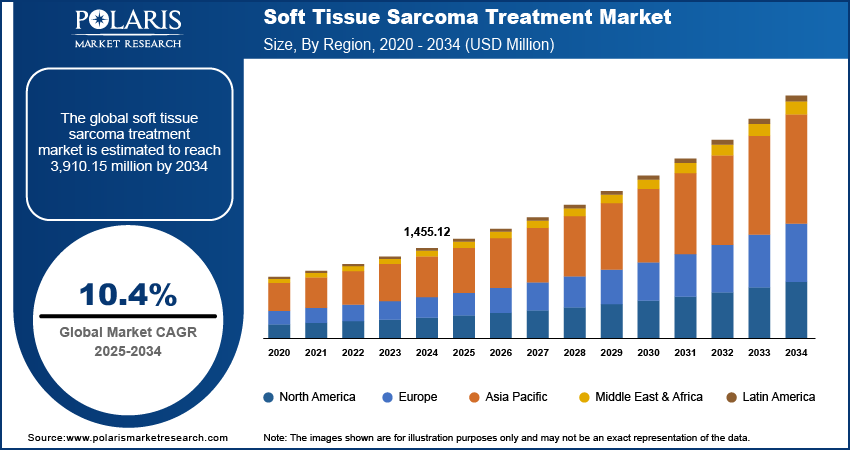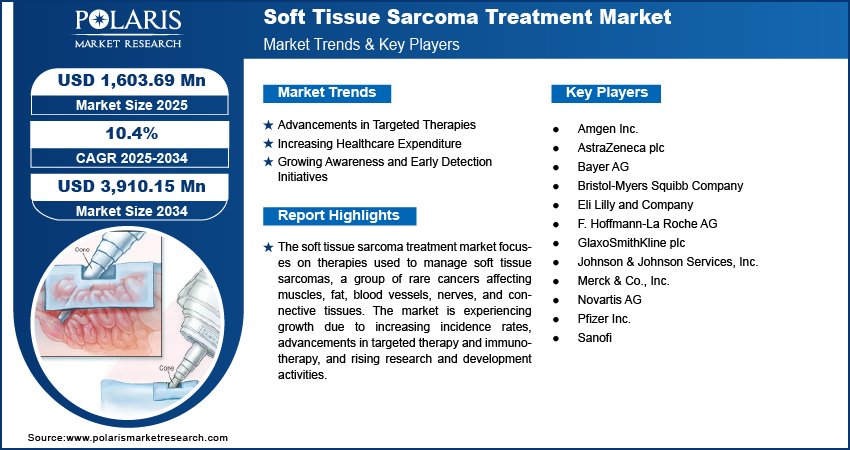
Soft Tissue Sarcoma Treatment Market Share, Size, Trends, Analysis, Industry Report By Treatment, By Disease, By Distribution Channel, By End User and Forecast, 2023 – 2032
- Published Date:Mar-2023
- Pages: 116
- Format: PDF
- Report ID: PM1620
- Base Year: 2022
- Historical Data: 2019-2021
Report Outlook
The global soft tissue sarcoma treatment market was valued at USD 1,341.59 million in 2022 and is expected to grow at a CAGR of 10.7% during the forecast period. Soft tissue sarcomas are a group of rare tumors that can arise in any part of the body. These tumors originate from cells in the soft tissues, such as fat, muscle, and connective tissue. Treatment for soft tissue sarcomas typically involve a combination of surgery, radiation therapy, and/or chemotherapy, depending on the type and location of the tumor.

Know more about this report: Request for sample pages
Surgery is generally the first line of treatment for soft tissue sarcomas and can involve either removing the tumor or a portion of the affected area. Radiation therapy may also be used to shrink or destroy the tumor and can be used in conjunction with surgery or as a standalone treatment. Chemotherapy is typically used as an adjunctive therapy to increase the effectiveness of the other treatment options.
Prognosis for soft tissue sarcomas can vary widely depending on the type, location, and stage of the cancer. Generally, the earlier the cancer is diagnosed and treated, the better the outcome. Treatment options and outcomes are constantly changing and improving, making it important to stay up to date on developments in the field.
Clinical trials are an important way to access cutting-edge treatments and to provide more insight into the best treatments for soft tissue sarcomas. Participating in a clinical trial can help to improve outcomes and quality of life for patients with soft tissue sarcomas.
Soft tissue sarcomas can be effectively treated with a combination of surgery, radiation therapy, and/or chemotherapy. Prognosis for soft tissue sarcomas can vary depending on the type, location, and stage of the cancer. Clinical trials and research can provide further insight into the best treatments for soft tissue sarcomas and help to improve outcomes and quality of life.
While surgery, radiation therapy, and chemotherapy are the most common treatments for soft tissue sarcomas, they are not the only options. Alternative treatments such as immunotherapy, targeted therapy, and herbal medicine have been found to be effective in treating soft tissue sarcomas. Additionally, lifestyle modifications such as diet and exercise can help to reduce the risk of developing soft tissue sarcomas and can aid in the recovery process.

Know more about this report: Request for sample pages
Industry Dynamics
Growth Drivers
The growth of soft tissue sarcoma treatment market is driven by abnormal activity of certain genes that control cell growth and division. These genes, known as oncogenes, can become mutated or activated in soft tissue sarcoma cells, leading to uncontrolled growth and proliferation. In addition, soft tissue sarcoma cells may also produce high levels of growth factors, which are signaling molecules that promote cell growth and division.
soft tissue sarcoma is a rare type of cancer, it is still a serious and life-threatening disease that should not be dismissed as insignificant. Even though the prevalence of soft tissue sarcoma may be low compared to other types of cancer, it still affects a significant number of people worldwide. Additionally, the fact that the causes of soft tissue sarcoma are not fully understood means that there is still much to learn about this disease and how to effectively treat it.
There are several treatment options available for soft tissue sarcoma, including surgery, radiation therapy, and chemotherapy. In some cases, targeted therapies that specifically target the abnormal genes or proteins involved in soft tissue sarcoma growth may also be effective. Ongoing research into the underlying mechanisms of soft tissue sarcoma growth and progression may lead to the development of new and more effective treatments for this challenging disease.
Report Segmentation
The market is primarily segmented based on treatment, indication, distribution channel, end-use, and region.
|
By Treatment |
By Indication |
By Distribution Channel |
By End Use |
By Region |
|
|
|
|
|
Know more about this report: Request for sample pages
The Anti-angiogenesis Drugs Segment is Expected to Witness the Fastest Growth in 2022
The anti-angiogenesis drugs segment is expected to witness the fastest growth over the forecast period due to increasing demand for these drugs in the treatment of cancer. This segment is driven by the rising prevalence of cancer and the need for effective treatments. Anti-angiogenesis drugs use a molecular approach to inhibit the growth of new blood vessels which tumors need to spread. This approach is particularly promising due to the fact that it has fewer side effects than other treatments, such as chemotherapy and radiation. Furthermore, the emergence of new and innovative treatments for cancer, such as immunotherapy and gene therapy, is also expected to add to the growth of the anti-angiogenesis drugs segment. As these treatments become more widely available, the demand for anti-angiogenesis drugs is expected to increase. Additionally, the increasing demand for personalized medicines is expected to create new opportunities for the growth of this segment. However, the high cost of these treatments is likely to limit the growth of the anti-angiogenesis drugs segment.
The Metastatic Sarcoma Segment Accounted for the Largest Market Share in 2022
The Metastatic Sarcoma segment accounted for the largest market share due to the rising prevalence of this type of cancer. Metastatic sarcoma is a type of cancer that has spread beyond its original site in the body and into different organs or tissue. This type of cancer is difficult to treat, and the prognosis is often poor. Therefore, the demand for effective treatments is high. The Metastatic Sarcoma segment is expected to be driven by the development of new drugs, such as immunotherapies and targeted therapies, which have proven to be effective in treating this type of cancer. Additionally, the increasing use of personalized medicines is expected to further drive the growth of this segment. However, the high cost of treatments is likely to impede the growth of the Metastatic Sarcoma segment.
The Demand in North America is Expected to Witness Significant Growth During the Forecast Period
The demand for soft tissue sarcomas in North America is expected to witness significant growth over the forecast period. This is due to the increasing prevalence of this type of cancer in the region, as well as the availability of advanced treatments. Additionally, the increasing focus on research and development of innovative treatments, such as immunotherapies and targeted therapies, is expected to drive the demand for soft tissue sarcomas in North America. Furthermore, the increasing prevalence of personalized medicines and the availability of better healthcare infrastructure in the region are expected to further drive the demand for soft tissue sarcomas in North America. However, the high cost of treatments is likely to limit the growth of this segment in the region.
Competitive Insight
Some of the major players operating in the global soft tissue sarcoma treatment market include Bristol-Myers Squibb, Merck & Co., Eli Lilly and Company, Novartis AG, Pfizer Inc., GlaxoSmithKline plc, AstraZeneca plc, Amgen Inc., Celgene Corporation, and Johnson & Johnson.
Soft Tissue Sarcoma Treatment Market Report Scope
|
Report Attributes |
Details |
|
Market size value in 2023 |
USD 1,482.59 million |
|
Revenue forecast in 2032 |
USD 3,704.27 million |
|
CAGR |
10.7% from 2023 - 2032 |
|
Base year |
2022 |
|
Historical data |
2019 - 2021 |
|
Forecast period |
2023 - 2032 |
|
Quantitative units |
Revenue in USD million and CAGR from 2023 to 2032 |
|
Segments covered |
By Payload, By Launch Platform, By Launch Vehicle, By End User, By Region |
|
Regional scope |
North America, Europe, Asia Pacific, Latin America, Middle East & Africa |
|
Key companies |
Bristol-Myers Squibb, Merck & Co., Eli Lilly and Company, Novartis AG, Pfizer Inc., GlaxoSmithKline plc, AstraZeneca plc, Amgen Inc., Celgene Corporation, Johnson & Johnson, Bayer AG, AbbVie Inc., Sanofi, Takeda Pharmaceuticals, and Gilead Sciences |
FAQ's
The global soft tissue sarcoma treatment market size is expected to reach USD 3,704.27 million by 2032.
Top key players in the soft tissue sarcoma treatment market are Bristol-Myers Squibb, Merck & Co., Eli Lilly and Company, Novartis AG, Pfizer Inc., GlaxoSmithKline plc, AstraZeneca plc, Amgen Inc., Celgene Corporation, and Johnson & Johnson.
North America contribute notably towards the global soft tissue sarcoma treatment market.
The global soft tissue sarcoma treatment market expected to grow at a CAGR of 10.7% during the forecast period.
The soft tissue sarcoma treatment market report covering key segments are treatment, indication, distribution channel, end user, and region.
